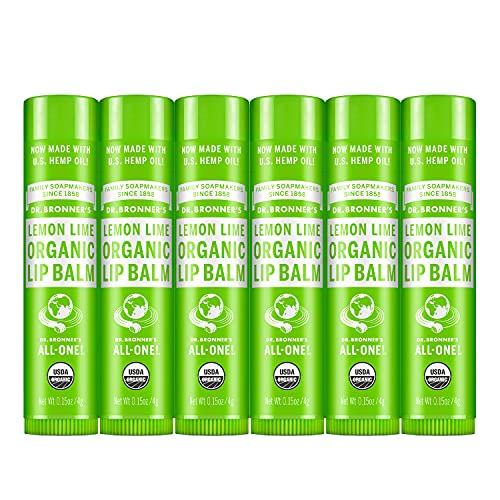
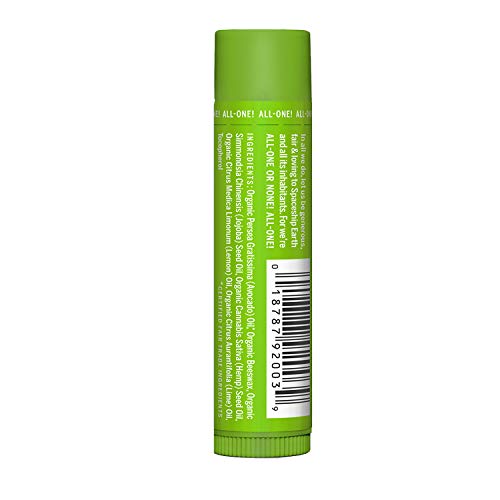
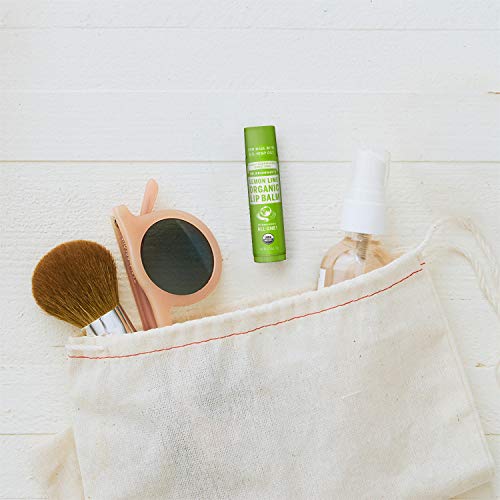
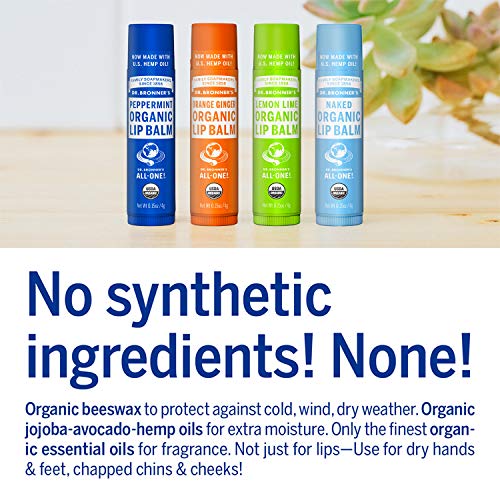
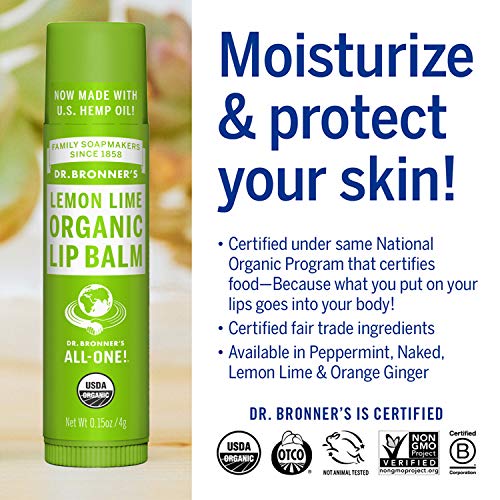
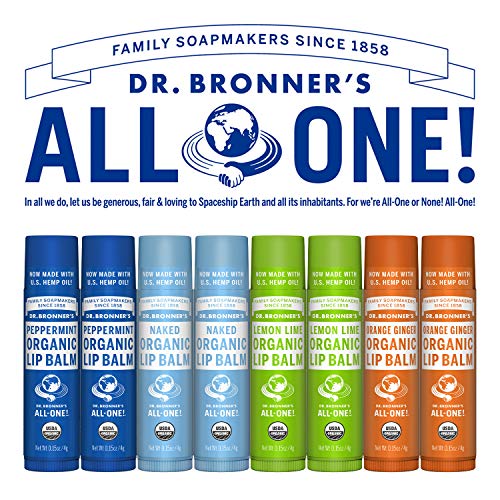
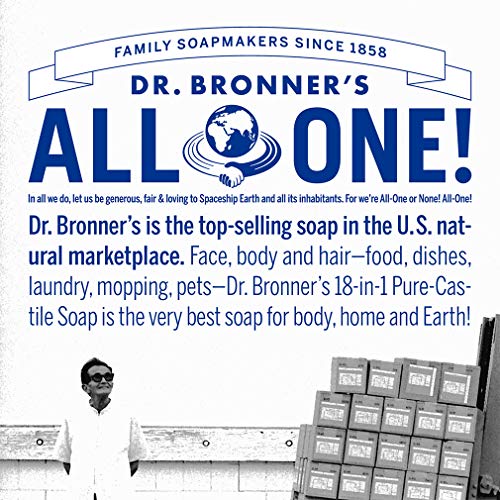
Dr. Bronner's Organic Lip Balm - Soothing Moisture with Beeswax & Jojoba Oil - Lemon Lime, 6-Pack


Cannabis Sativa (Hemp) Extract
High RiskCannabis sativa (hemp) extract is derived from the hemp plant, primarily used for its potential therapeutic properties. It contains various cannabinoids, flavonoids, and terpenes, which may contribute to its functional benefits in cosmetic and wellness products. The extract is often sought for its calming and anti-inflammatory effects.
Sustai Insights
Cannabis sativa (hemp) extract offers functional benefits such as anti-inflammatory properties and potential skin-soothing effects. It is derived from sustainably sourced hemp, contributing to its appeal. However, there are health risks associated with its use, including low concerns for carcinogenicity and neurotoxicity. Regulatory restrictions exist in certain jurisdictions, marking it as high risk overall. Safe usage should be practiced, particularly in sensitive applications, and alternatives like hemp seed oil may be considered for specific uses.
Citrus Aurantifolia (Lime) Peel Oil
Medium RiskCitrus aurantifolia (lime) peel oil is derived from the peel of lime fruits. It is commonly used for its aromatic properties in various products, including cosmetics and personal care items, where it may serve as a fragrance or natural preservative.
Sustai Insights
Citrus aurantifolia (lime) peel oil offers functional benefits as a natural fragrance and potential antimicrobial agent. However, it has a high allergenic potential, posing risks of skin irritation and sensitization. Environmental concerns include its persistence in ecosystems and moderate use restrictions in some regions. Regulatory bodies have advised caution regarding its use due to these health and environmental risks. Overall, the ingredient is assessed as a medium risk, suggesting careful usage and consideration of alternatives, such as non-citrus essential oils or synthetic fragrances, for sensitive applications.
Thuja Occidentalis (Arborvitae)
Medium RiskThuja occidentalis, commonly known as arborvitae, is a coniferous tree native to North America. It is often used in cosmetics and personal care products for its potential antimicrobial properties and as a fragrance component. Its essential oil is extracted for various applications in aromatherapy and traditional medicine.
Sustai Insights
Thuja occidentalis offers functional benefits, including antimicrobial properties and use as a natural fragrance. However, it may pose moderate allergenic risks and is not associated with significant health concerns like carcinogenicity or reproductive toxicity. Regulatory assessments indicate low restrictions on its use. Environmental impacts include potential for irritation and moderate toxicity to aquatic life. Overall, its risk level is categorized as medium, suggesting careful consideration during usage. Alternatives include other plant-based oils with similar benefits but lower allergenic potential.
Simmondsia Chinensis (Jojoba)
Low RiskSimmondsia chinensis, commonly known as jojoba, is an oil derived from the seeds of the jojoba plant. It is commonly used in cosmetic formulations for its moisturizing properties, acting as an emollient and skin conditioning agent.
Sustai Insights
Jojoba oil offers functional benefits such as effective skin moisturization and is biodegradable, with sustainable sourcing practices. Health risks are low, with minimal concerns regarding carcinogenicity, allergies, and reproductive toxicity. Environmental impact is negligible, with no pollutant or bioaccumulation potential. Regulatory status is favorable with no significant restrictions noted. Overall, it is assessed as low risk, and safe usage practices should be maintained. Alternatives include other plant-derived oils like argan or almond oil, which may provide similar benefits.
Citrus Limon (Lemon) Peel
Low RiskCitrus limon (lemon) peel is derived from the outer skin of lemons and is commonly used in cosmetic formulations for its aromatic properties and potential skin benefits. It serves primarily as a fragrance agent and may also provide antioxidant effects.
Sustai Insights
Citrus limon (lemon) peel is valued for its aromatic contributions and potential antioxidant properties, which can enhance product appeal. It has a low risk of adverse health effects, including low concerns for carcinogenicity, allergies, and irritation. Environmental risks are minimal, with no significant evidence of bioaccumulation or pollution. Regulatory assessments indicate no restrictions on use. Overall, it is considered low risk, and safe usage practices should be maintained. Alternatives may include other citrus peels or natural fragrance compounds.
Beeswax, Yellow
Low RiskBeeswax, yellow, is a natural wax produced by honeybees, primarily composed of esters of fatty acids and long-chain alcohols. It serves as an emulsifier, thickener, and stabilizer in cosmetic formulations, contributing to texture and consistency. It is commonly used in creams, balms, and lip products.
Sustai Insights
Beeswax provides functional benefits such as enhancing product texture and acting as a natural emulsifier, while also being biodegradable and sustainably sourced. Health risks are minimal, with low concerns for carcinogenicity, allergies, or irritations. Environmental impacts are also low, as it does not bioaccumulate. Regulatory status remains favorable with no current restrictions. Overall, the ingredient poses low risk, making it a suitable choice in cosmetic formulations.
Tocopherol, D Alpha
Low RiskTocopherol, specifically d-alpha tocopherol, is a naturally occurring form of Vitamin E. It is commonly used in cosmetic and personal care products primarily for its antioxidant properties, helping to protect formulations from oxidation and extend shelf life.
Sustai Insights
D-alpha tocopherol provides effective antioxidant benefits, contributing to product stability. It is sustainably sourced and generally regarded as safe, with low concerns regarding carcinogenicity, allergies, and reproductive toxicity. However, there are minor concerns about endocrine disruption. Regulatory bodies have not imposed significant restrictions, indicating low overall risk. Recommended usage practices include adhering to established safe concentration thresholds. Alternatives, such as other forms of Vitamin E or plant-based antioxidants, may also be considered.
Simmondsia Chinensis (Jojoba)
Low RiskSimmondsia chinensis, commonly known as jojoba, is an oil derived from the seeds of the jojoba plant. It is commonly used in cosmetic formulations for its moisturizing properties, acting as an emollient and skin conditioning agent.
Sustai Insights
Jojoba oil offers functional benefits such as effective skin moisturization and is biodegradable, with sustainable sourcing practices. Health risks are low, with minimal concerns regarding carcinogenicity, allergies, and reproductive toxicity. Environmental impact is negligible, with no pollutant or bioaccumulation potential. Regulatory status is favorable with no significant restrictions noted. Overall, it is assessed as low risk, and safe usage practices should be maintained. Alternatives include other plant-derived oils like argan or almond oil, which may provide similar benefits.
Citrus Limon (Lemon) Peel
Low RiskCitrus limon (lemon) peel is derived from the outer skin of lemons and is commonly used in cosmetic formulations for its aromatic properties and potential skin benefits. It serves primarily as a fragrance agent and may also provide antioxidant effects.
Sustai Insights
Citrus limon (lemon) peel is valued for its aromatic contributions and potential antioxidant properties, which can enhance product appeal. It has a low risk of adverse health effects, including low concerns for carcinogenicity, allergies, and irritation. Environmental risks are minimal, with no significant evidence of bioaccumulation or pollution. Regulatory assessments indicate no restrictions on use. Overall, it is considered low risk, and safe usage practices should be maintained. Alternatives may include other citrus peels or natural fragrance compounds.
Citrus Aurantifolia (Lime) Peel Oil
Medium RiskCitrus aurantifolia (lime) peel oil is derived from the peel of lime fruits. It is commonly used for its aromatic properties in various products, including cosmetics and personal care items, where it may serve as a fragrance or natural preservative.
Sustai Insights
Citrus aurantifolia (lime) peel oil offers functional benefits as a natural fragrance and potential antimicrobial agent. However, it has a high allergenic potential, posing risks of skin irritation and sensitization. Environmental concerns include its persistence in ecosystems and moderate use restrictions in some regions. Regulatory bodies have advised caution regarding its use due to these health and environmental risks. Overall, the ingredient is assessed as a medium risk, suggesting careful usage and consideration of alternatives, such as non-citrus essential oils or synthetic fragrances, for sensitive applications.
Beeswax, Yellow
Low RiskBeeswax, yellow, is a natural wax produced by honeybees, primarily composed of esters of fatty acids and long-chain alcohols. It serves as an emulsifier, thickener, and stabilizer in cosmetic formulations, contributing to texture and consistency. It is commonly used in creams, balms, and lip products.
Sustai Insights
Beeswax provides functional benefits such as enhancing product texture and acting as a natural emulsifier, while also being biodegradable and sustainably sourced. Health risks are minimal, with low concerns for carcinogenicity, allergies, or irritations. Environmental impacts are also low, as it does not bioaccumulate. Regulatory status remains favorable with no current restrictions. Overall, the ingredient poses low risk, making it a suitable choice in cosmetic formulations.
Tocopherol, D Alpha
Low RiskTocopherol, specifically d-alpha tocopherol, is a naturally occurring form of Vitamin E. It is commonly used in cosmetic and personal care products primarily for its antioxidant properties, helping to protect formulations from oxidation and extend shelf life.
Sustai Insights
D-alpha tocopherol provides effective antioxidant benefits, contributing to product stability. It is sustainably sourced and generally regarded as safe, with low concerns regarding carcinogenicity, allergies, and reproductive toxicity. However, there are minor concerns about endocrine disruption. Regulatory bodies have not imposed significant restrictions, indicating low overall risk. Recommended usage practices include adhering to established safe concentration thresholds. Alternatives, such as other forms of Vitamin E or plant-based antioxidants, may also be considered.
Thuja Occidentalis (Arborvitae)
Medium RiskThuja occidentalis, commonly known as arborvitae, is a coniferous tree native to North America. It is often used in cosmetics and personal care products for its potential antimicrobial properties and as a fragrance component. Its essential oil is extracted for various applications in aromatherapy and traditional medicine.
Sustai Insights
Thuja occidentalis offers functional benefits, including antimicrobial properties and use as a natural fragrance. However, it may pose moderate allergenic risks and is not associated with significant health concerns like carcinogenicity or reproductive toxicity. Regulatory assessments indicate low restrictions on its use. Environmental impacts include potential for irritation and moderate toxicity to aquatic life. Overall, its risk level is categorized as medium, suggesting careful consideration during usage. Alternatives include other plant-based oils with similar benefits but lower allergenic potential.
Cannabis Sativa (Hemp) Extract
High RiskCannabis sativa (hemp) extract is derived from the hemp plant, primarily used for its potential therapeutic properties. It contains various cannabinoids, flavonoids, and terpenes, which may contribute to its functional benefits in cosmetic and wellness products. The extract is often sought for its calming and anti-inflammatory effects.
Sustai Insights
Cannabis sativa (hemp) extract offers functional benefits such as anti-inflammatory properties and potential skin-soothing effects. It is derived from sustainably sourced hemp, contributing to its appeal. However, there are health risks associated with its use, including low concerns for carcinogenicity and neurotoxicity. Regulatory restrictions exist in certain jurisdictions, marking it as high risk overall. Safe usage should be practiced, particularly in sensitive applications, and alternatives like hemp seed oil may be considered for specific uses.
Experience the nourishing power of Dr. Bronner's Organic Lip Balm. This versatile, cruelty-free balm combines organic beeswax and avocado oil to soothe and protect dry lips, hands, and skin, making it the perfect companion for all your moisturizing needs.
- USDA Organic & Fair Trade: Made with only the purest organic ingredients, ensuring you care for your health and the planet simultaneously.
- Multi-Purpose Use: Ideal for dry lips, hands, cuticles, and any chapped skin areas, providing soothing relief wherever needed.
- Natural Moisturization: Enriched with jojoba and hemp seed oil, this balm delivers deep hydration to keep your skin feeling soft and supple.
- Cruelty-Free Commitment: Dr. Bronner's stands firm against animal testing, proudly carrying the Leaping Bunny logo.
- Certified Organic: Compliant with the National Organic Program, ensuring what you apply is safe and beneficial for your body.
This lip balm not only enhances your skincare routine but also supports sustainable and ethical practices, making it a responsible choice for conscious consumers.
Subscribe & Save with Sustai
- Best Price Guarantee: Always enjoy the lowest prices on sustainable home essentials.
- No Surprises: We’ll notify you before shipping. No hidden fees, ever.
- You’re in Charge: Change, pause, or cancel your subscription anytime with ease.
- Eco-Friendly Deliveries: Our grouped shipments mean less packaging and lower emissions.
Join us on a sustainable journey. Special offers for a limited time! Prices and promotions may change.
Recommended Products
Experience the nourishing power of Dr. Bronner's Organic Lip Balm. This versatile, cruelty-free balm combines organic beeswax and avocado oil to soothe and protect dry lips, hands, and skin, making it the perfect companion for all your moisturizing needs.
- USDA Organic & Fair Trade: Made with only the purest organic ingredients, ensuring you care for your health and the planet simultaneously.
- Multi-Purpose Use: Ideal for dry lips, hands, cuticles, and any chapped skin areas, providing soothing relief wherever needed.
- Natural Moisturization: Enriched with jojoba and hemp seed oil, this balm delivers deep hydration to keep your skin feeling soft and supple.
- Cruelty-Free Commitment: Dr. Bronner's stands firm against animal testing, proudly carrying the Leaping Bunny logo.
- Certified Organic: Compliant with the National Organic Program, ensuring what you apply is safe and beneficial for your body.
This lip balm not only enhances your skincare routine but also supports sustainable and ethical practices, making it a responsible choice for conscious consumers.

You can have at most 2 Sustainable Steals products in your cart
Customer Reviews
Customers’ View
Customers appreciate the nourishing and eco-friendly qualities of Dr. Bronner's Organic Lip Balm. Many users highlight the product's ability to effectively soothe and moisturize dry, chapped lips, with comments noting, 'My lips feel so great with this lip balm!' Additionally, customers value the organic ingredients, emphasizing that it provides comfort without harsh chemicals. The balm's longevity and smooth application have led to loyal usage, with one reviewer stating they've been a customer for eight years. Furthermore, the cruelty-free and sustainably sourced components align well with the values of health-conscious individuals. Overall, customers find this lip balm to be a reliable and ethical choice for lip care.
AI-generated from the text of customer reviewsThis product has no reviews yet.





